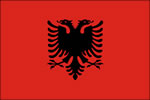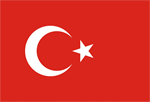|
|
President of the Republic |
Bujar Nishani |
Prime Minister |
Sali Berisha |
Foreign Minister |
Edmond Panariti |
Capital City |
Tirana (640.000) |
Area |
28.750 km2 |
Population |
3.6 million |
GENERAL INFORMATION OF ALBANIA
Albania (Albanian: Shqipëri/Shqipëria, Gheg Albanian: Shqipnia or Shqypnia), officially the Republic of Albania is a Mediterranean country in South Eastern Europe. It is bordered by Montenegro to the northwest, Kosovo to the northeast, Macedonia to the east and Greece to the southeast. It has a coast on the Adriatic Sea to the west, and on the Ionian Sea to the southwest. It is less than 72 km (45 mi) from Italy, across the Strait of Otranto which links the Adriatic Sea to the Ionian Sea.
Albania is a member of the United Nations, NATO, the Organization for Security and Co-operation in Europe, Council of Europe, World Trade Organisation, Organisation of the Islamic Conference and one of the founding members of the Union for the Mediterranean. Albania has been a potential candidate for accession to the European Union since January 2003, and it formally applied for EU membership on 28 April 2009.
HISTORY OF ALBANIA
The History of Albania emerges from the prehistoric stage from the 4th century BCE, with early records of Illyria in Greco-Roman historiography. The modern territory of Albania has no counterpart in antiquity, comprising parts of the Roman provinces of Dalmatia (southern Illyricum), Macedonia (particularly Epirus Nova), and Moesia Superior. The territory remained under Roman (Byzantine) control until the Slavic migrations of the 7th century, and was integrated into the Bulgarian Empire in the 9th century.
The territorial nucleus of the Albanian state forms in the Middle Ages, as the Principality of Arbër and the Kingdom of Albania. The first records of the Albanian people as a distinct ethnicity also date to this period. The area was conquered in the 15th century by the Ottoman Empire and remained under Ottoman control as part of the Rumelia province until 1912, when the first independent Albanian state was declared. The formation of an Albanian national consciousness dates to the later 19th century and is part of the larger phenomenon of rise of nationalism under the Ottoman Empire. A short-lived monarchy (1914-1925) was succeeded by an even shorter-lived first Albanian Republic (1925-1928), to be replaced by another monarchy (1928-1939), which was conquered into Fascist Italy during World War II. After the collapse of the Axis powers, Albania became a communist state, the Socialist People's Republic of Albania, which for the most part of its duration was dominated by Enver Hoxha (d. 1985). Hoxha's political heir Ramiz Alia oversaw the disintegration of the "Hoxhaist" state during the wider collapse of the Eastern Bloc in the later 1980s.
The communist regime collapsed in 1990, and the Republic of Albania was founded in 1991 and the former communist party was routed in elections March 1992, amid economic collapse and social unrest. Further crisis during the 1990s, peaking in the 1997 Lottery Uprising, led to mass emigration of Albanians, mostly to Italy, Greece, Switzerland, Germany and to North America during the 1990s. Albania became a full member of NATO in 2009. The country is applying to join the European Union.
More >>>
|


